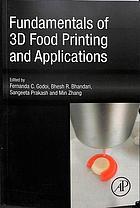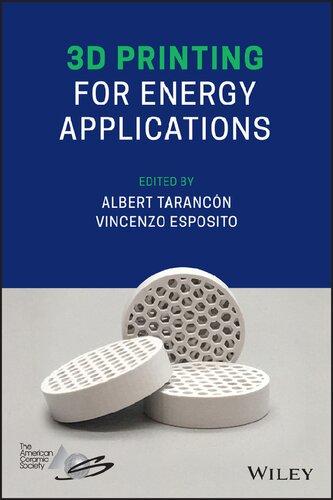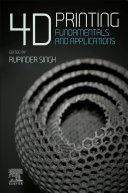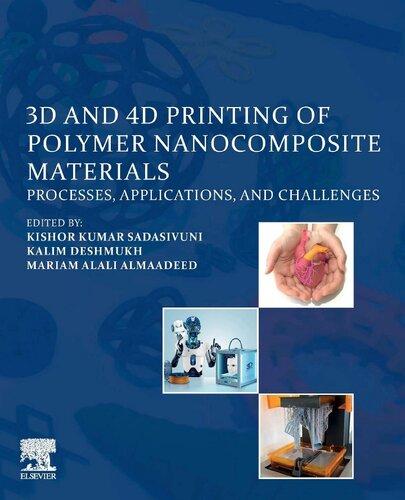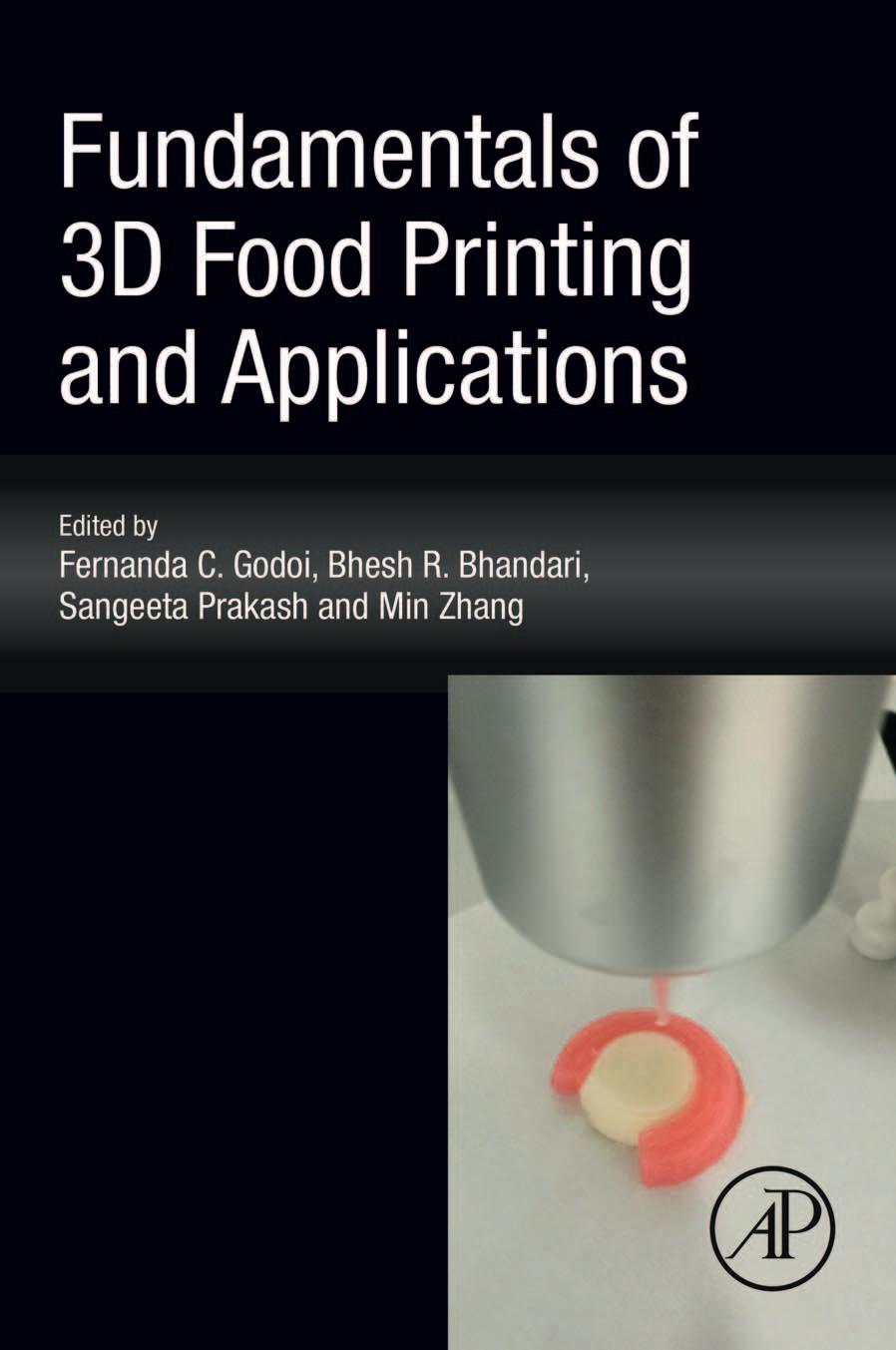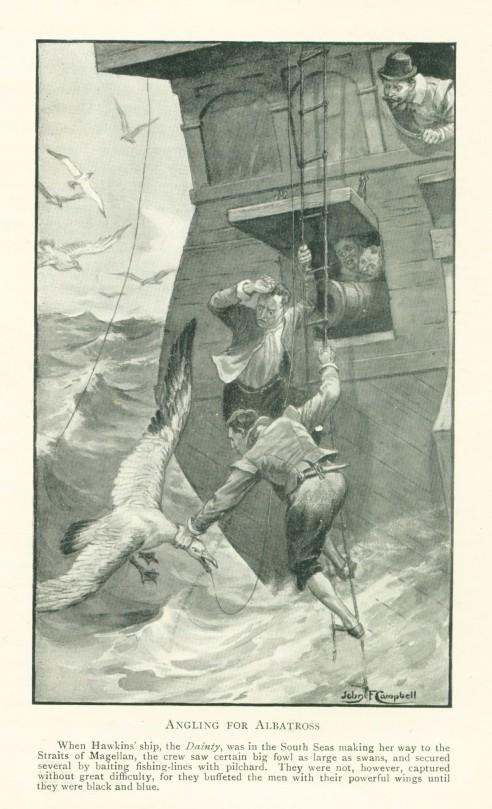Fundamentalsof3D FoodPrintingand Applications
Editedby FernandaC.Godoi
BheshR.Bhandari
SangeetaPrakash
MinZhang
AcademicPressisanimprintofElsevier
125LondonWall,LondonEC2Y5AS,UnitedKingdom 525BStreet,Suite1650,SanDiego,CA92101,UnitedStates 50HampshireStreet,5thFloor,Cambridge,MA02139,UnitedStates TheBoulevard,LangfordLane,Kidlington,OxfordOX51GB,UnitedKingdom
Copyright 2019ElsevierInc.Allrightsreserved.
Nopartofthispublicationmaybereproducedortransmittedinanyformorbyanymeans, electronicormechanical,includingphotocopying,recording,oranyinformationstorage andretrievalsystem,withoutpermissioninwritingfromthepublisher.Detailsonhowto seekpermission,furtherinformationaboutthePublisher’spermissionspoliciesandour arrangementswithorganizationssuchastheCopyrightClearanceCenterandtheCopyright LicensingAgency,canbefoundatourwebsite: www.elsevier.com/permissions.
Thisbookandtheindividualcontributionscontainedinitareprotectedundercopyrightby thePublisher(otherthanasmaybenotedherein).
Notices
Knowledgeandbestpracticeinthisfieldareconstantlychanging.Asnewresearchand experiencebroadenourunderstanding,changesinresearchmethods,professionalpractices, ormedicaltreatmentmaybecomenecessary.
Practitionersandresearchersmustalwaysrelyontheirownexperienceandknowledgein evaluatingandusinganyinformation,methods,compounds,orexperimentsdescribed herein.Inusingsuchinformationormethodstheyshouldbemindfuloftheirownsafetyand thesafetyofothers,includingpartiesforwhomtheyhaveaprofessionalresponsibility.
Tothefullestextentofthelaw,neitherthePublishernortheauthors,contributors,oreditors, assumeanyliabilityforanyinjuryand/ordamagetopersonsorpropertyasamatterof productsliability,negligenceorotherwise,orfromanyuseoroperationofanymethods, products,instructions,orideascontainedinthematerialherein.
LibraryofCongressCataloging-in-PublicationData
AcatalogrecordforthisbookisavailablefromtheLibraryofCongress
BritishLibraryCataloguing-in-PublicationData
AcataloguerecordforthisbookisavailablefromtheBritishLibrary
ISBN:978-0-12-814564-7
ForinformationonallAcademicPresspublicationsvisitour websiteat https://www.elsevier.com/books-and-journals
Publisher: AndreGerhardWolff
AcquisitionEditor: NinaRosadeAraujoBandeira
EditorialProjectManager: SusanIkeda
ProductionProjectManager: DivyaKrishnaKumar
CoverDesigner: MilesHitchen TypesetbyTNQTechnologies
3.3Computer-AidedDesignSystemstoCreate3DVirtual
3.4ProcessPlanningof3DFoodPrinting 60
3.4.1BasicPrinciplesoftheSlicingSoftwaretoPrepare 3DFoodPrinting62
3.4.2PrintingVariablesandTheirEffectsontheQuality of3DEdibleObjects63
3.5TheFirmwareofthe3DPrinter:BasicPrinciplesand SettingsThatAffectthePrintingQuality
3.6G-Code:TheLanguageToDrivePrintersandTo OptimisePrintingQuality
4. Cereal-BasedandInsect-EnrichedPrintableFood: FromFormulationtoPostprocessingTreatments. StatusandPerspectives 93 RossellaCaporizzi,AntonioDerossiandCarlaSeverini
4.1Introduction
4.23DPrintingTechnologiesforCereal-BasedFormulations 94
4.3FactorsAffectingthePrintabilityofaDough 97
4.3.1EffectofIngredientsandNutritionalCompounds inthe3DPrintingProcess98
4.3.2TheUseofBindingAgentstoImprovethe PrintabilityofDough100
4.4PostprocessingTechnologies
4.5TexturalPropertiesof3D-PrintedCereal-BasedProducts 104
4.6PrintingVariablesAffectingtheQualityofCereal-Based Products 107
4.7InnovativeFoodFormulationsin3DPrinting:TheCase ofCereal-BasedProductsEnrichedWithEdibleInsects 108
4.7.1NutritionalPropertiesofEdibleInsects108
4.7.2CurrentResearchin3DPrintingforObtaining Insect-EnrichedProducts110
4.8Conclusions 113
5. 3DPrintedFoodFromFruitsandVegetables 117 IldeRicci,AntonioDerossiandCarlaSeverini
5.1Introduction 117
5.2PotentialApplicationof3DPrintingTechnologyfor Vegetable-BasedProducts 118
5.2.1PotentialNutritionalandHealthyPropertiesof3D PrintedFruitandVegetablesUsedfor3DPrinting119
5.3ProcessingStepsforFruitandVegetablePrinting 123
5.3.1SelectionofRawFruitsandVegetablesand DesigningofPersonalisedFoodFormulas126
5.3.2ProcessingStepsforPreparingFruitsand Vegetablesfor3DPrinting129
5.4SettingsofConditionsforFruitandVegetable 3DPrinting 134
5.5MethodstoImprovetheShelf-LifeofVegetable 3DPrintedFoods 139
5.6TheUseofFruitandVegetableWastefor3DFood PrintingasFuturePerspectives
6. 3DPrintingChocolate:PropertiesofFormulations forExtrusion,Sintering,BindingandInkJetting 151 MatthewLanaro,MathildeR.DesselleandMariaA.Woodruff
6.1Introduction
6.2PropertiesofChocolate
6.2.1ChocolateStructure155 6.2.2ChocolateRheology157
6.3ChocolateFormulations
6.3.1CommonChocolateProducts158 6.3.2SpecialtyChocolateProducts160
6.43DPrintingPlatform
6.53DPrintingChocolate:Extrusion
6.5.1ProcessOptimisation166
6.63DPrintingChocolate:SinteringandBinding
6.73DPrintingChocolate:Inkjet
6.8FutureTrends
7. PotentialApplicationsofDairyProducts, IngredientsandFormulationsin3DPrinting 175 MeganM.Ross,AlanL.KellyandShaneV.Crowley
7.1Introduction
7.2OverviewofRelevant3DPrintingTechnologies
7.3Structure-FormingMechanismsInvolving MilkComponents 181
7.3.1MilkProteins181
7.3.2MilkFat184
7.3.3Lactose185
7.4StudiesofPrintableDairyStructures 186
7.5AnalyticalToolsfor3D-PrintedDairyApplications 188
Contents
7.6CaseStudy:3DPrintingofProcessedCheese 193
7.7ResearchNeeds,ChallengesandOpportunities 197
7.7.1SafetyandAcceptance197
7.7.2ResearchChallenges197
7.7.3IndustrialAdvantagesandDisadvantages199 References 200 FurtherReading 206
8. Material,ProcessandBusinessDevelopmentfor 3DChocolatePrinting 207
LiangHao,YanLi,PingGongandWeilXiong
8.1Introduction
8.2CommercialFeasibilityStudy 210
8.2.1ChocolateBackground210
8.2.2ChocolateStatusQuo210
8.2.3Researchonthe3DChocolatePrinting BusinessModel211
8.3DevelopmentofChocolate3DPrintingTechnology 216
8.3.1ChocolateFeatures216
8.3.2ChocolateAdditiveLayerManufacturing219
8.3.3Experimental221
8.3.4ResultsandDiscussion223
8.3.5Conclusions229
8.4OptimisationofChocolate3DPrintingTechnology 230
8.4.1AdaptiveExtrusionLayerThicknessOptimisation BasedonAreaChangeRate230
8.4.2LayerScanningSpeedOptimisationBasedon PerimeterChangeRate233
8.4.3Conclusions236
8.5ExtensionofChocolate3DPrintingApplication Technology 237
8.5.1HealthcareProductsandChocolate3DPrinting238
8.5.2FeasibilityExperimentofAddingHealthcare Products240
8.6SummaryandOutlook
9. CreationofFoodStructuresThrough BinderJetting
SoniaHolland,TimFosterandChrisTuck
9.1IntroductiontoBinderJetting
9.5FormulatingaFunctionalPrintingInk
9.5.1InkJettingTheory267
9.5.2ViscosityConsiderationsforInkJetting269
9.5.3TheEffectsofAdditivestoEnhanceViscosity271
9.5.4SurfaceTensionandDensity273
9.6ControlsandConsiderationsDuringandPostprinting
9.6.1PrinterSettings274
9.6.2CombiningPowderandInkDuringPrint276
9.7Postprocessing
` niaHurtado
10.2.1HowDoes3DFoodPrintingWork?291 10.2.23DFoodPrinters292
10.3FoodPreparationsforExtruder-Based3DFoodPrinting
10.3.1FoodPreparationExamplesRelatedtoPrintPurpose301 10.3.2RheologicalLimitationsandTechnicalConsiderations302
10.3.33DPrinterDevice-RelatedTechnicalConsiderations307 10.43DFoodPrintingatHome
10.4.1A3DFoodPrinterConceivedasa‘MiniFoodFactory’308 10.4.2Versatility:EverydayCookingandFineCuisine, atHomeandHospitality310
10.4.3TraditionalRecipesandAdaptedFormulations311 10.4.4Reduce,Reuse,Recycle.EnvironmentFriendly andaPotentialContributortoCircularEconomy314 10.4.5DomesticApplicationswithDieteticPurposes315 10.5Limitations,GeneralConsiderationsandConclusions
11. Prosumer-Driven3DFoodPrinting:RoleofDigital PlatformsinFuture3DFoodPrintingSystems
JouniPartanen
11.4.1MarketSegmentation335
11.4.23DFoodPrintingEcosystemandAssociated ValueChains337
11.5FoodProsumptionWith3DFoodPrinting
11.5.1ChangeDrivers342
11.5.2FutureofFood343
11.5.3DigitalPlatformfor3DFoodPrinting345
11.5.4FuturisticApplicationAreas345 11.5.5ExampleUseCases348 11.5.6TheImpact350
13. FutureOutlookof3DFoodPrinting
SangeetaPrakash,BheshR.Bhandari,FernandaC.Godoi andMinZhang
13.2.1ConstructswithVaryingMicrostructureLeading toNovelFoodTextures375
13.2.2ImprovedTexture-ModifiedFoodforPeople withSwallowingandChewingDifficulties375
13.2.3IncreasedFruitandVegetableIntakeAmongChildren377
13.2.4HealthyFoodsWithReducedFat,SugarandSalt378
13.2.5PreventingWastageofPerishablesandSustainability379 13.3WhattoExpectintheNext5Years?
ListofContributors
BheshR.Bhandari,SchoolofAgricultureandFoodSciences,TheUniversityof Queensland,Brisbane,QLD,Australia
RossellaCaporizzi,DepartmentofScienceofAgriculture,FoodandEnvironment (SAFE) UniversityofFoggia,Foggia,Italy
ShaneV.Crowley,SchoolofFoodandNutritionalSciences,UniversityCollegeCork, Cork,Ireland
AntonioDerossi,DepartmentofScienceofAgriculture,FoodandEnvironment (SAFE) UniversityofFoggia,Foggia,Italy
MathildeR.Desselle,QueenslandUniversityofTechnology(QUT),Scienceand EngineeringFaculty,Brisbane,QLD,Australia
TimFoster,DivisionofFoodScience,SuttonBoningtonCampus,Universityof Nottingham,Loughborough,UnitedKingdom
FernandaC.Godoi,TessenderloInnovationCenter TessenderloGroup,Tessenderlo, Belgium
PingGong,AdvancedManufacturingResearchCentreforJewellery,Gemmological Institute,ChinaUniversityofGeosciences,Wuhan,China
LiangHao,AdvancedManufacturingResearchCentreforJewellery,Gemmological Institute,ChinaUniversityofGeosciences,Wuhan,China
SoniaHolland,DivisionofFoodScience,SuttonBoningtonCampus,University ofNottingham,Loughborough,UnitedKingdom;3DPrintingandAdditive ManufacturingResearchGroup,UniversityPark,UniversityofNottingham, Nottingham,UnitedKingdom
So ` niaHurtado,FormerLeadFoodTechnologistatNaturalMachinesSL
In ˜ igoFloresItuarte,DepartmentofMechanicalEngineering,AaltoUniversity,Espoo, Finland
SiddharthJayaprakash,DepartmentofMechanicalEngineering,AaltoUniversity, Espoo,Finland
AlanL.Kelly,SchoolofFoodandNutritionalSciences,UniversityCollegeCork, Cork,Ireland
MatthewLanaro,QueenslandUniversityofTechnology(QUT),ScienceandEngineeringFaculty,Brisbane,QLD,Australia
YanLi,AdvancedManufacturingResearchCentreforJewellery,Gemmological Institute,ChinaUniversityofGeosciences,Wuhan,China
ZhenbinLiu,StateKeyLaboratoryofFoodScienceandTechnology,Jiangnan University,Wuxi,China
JouniPartanen,DepartmentofMechanicalEngineering,AaltoUniversity,Espoo, Finland
SangeetaPrakash,SchoolofAgricultureandFoodSciences,TheUniversityof Queensland,Brisbane,QLD,Australia
IldeRicci,DepartmentofScienceofAgriculture,FoodandEnvironment(SAFE) UniversityofFoggia,Foggia,Italy
MeganM.Ross,SchoolofFoodandNutritionalSciences,UniversityCollegeCork, Cork,Ireland
Estefanı´aRubio,FormerResearcherinFoodScienceandTechnologyatNatural MachinesSL
CarlaSeverini,DepartmentofScienceofAgriculture,FoodandEnvironment (SAFE) UniversityofFoggia,Foggia,Italy
JasperL.Tran,UniversityofMinnesota,SanFrancisco,UnitedStates
ChrisTuck,3DPrintingandAdditiveManufacturingResearchGroup,University Park,UniversityofNottingham,Nottingham,UnitedKingdom
MariaA.Woodruff,QueenslandUniversityofTechnology(QUT),Scienceand EngineeringFaculty,Brisbane,QLD,Australia
WeilXiong,AdvancedManufacturingResearchCentreforJewellery,Gemmological Institute,ChinaUniversityofGeosciences,Wuhan,China
MinZhang,StateKeyLaboratoryofFoodScienceandTechnology,Jiangnan University,Wuxi,China
Preface
Theincreasingdemandforpersonalisedfoodhasencouragedaperiodofinnovationandexperimentationwithemergingtechniquestocustomisetexture, flavourandnutritionalcontentsoffoods.Inthisscenario,three-dimensional(3D) printingtechnologyisanemergingtechnologythatoccupiesahighrankbecause ofitsabilitytocreatecomplexedibleshapesand,atthesametime,enable alterationoffoodtextureandnutritionalcontentrequiredbyspecificdiets.
Althoughthefirstreportsabout3Dfoodprintingarecompletingnearlya decade,mosttheexistingliteratureiscomposedofresearcharticles,patents, reviewpapersandinterviewsinnonscientificmagazines.Thisbookprovidesa broadpictureof3Dfoodprintingtechnologies,includingtheirworkingmechanismswithinabroadspectrumofapplicationareas,includingbutnotlimitedto thedevelopmentofsoftfoodsandconfectionarydesigns.Effortshavebeen devotedtoprovideauniqueandcontemporaryguidetoassistthecorrelation betweenthesupplymaterials(edibleformulations)andtechnologies(e.g., extrusionandinkjetintoapowderbed)usedduringtheconstructionof computer-aided3Dshapes.
Thebookpresentsseveralchapterscontributedbyleadingscientistsworking on3Dfoodprintingtechnology.Chapter1presentsanintroductiontothe principlesof3Dfoodprinting,emphasisingthecorrelationwithinrheology behaviourand3Dprintingtechniques(inkjetandextrusionbased).Chapter2 highlightstheimportanceofself-supportingmechanisms,processparameters, materials’propertiesandpretreatmentandpostprocessingmethodsinachieving anaccurateandpreciseprintingintheprintingprocess.Averyinteresting approachispresentedinChapter3,whichcorrelateseachphaseofthedevelopmentofa3Dprintedfoodwiththealgorithmsusedbyacomputer-aided design(CAD)andprintabilityfeaturesoffood-relatedproducts.Theauthors ofChapter3aimedtogivethebasicinformationtocontrolprintingmovements, makingpossiblethematchbetween3Dfoodandvirtualmodelsasmuchas possible.
TheprintabilityofseveralmaterialsisdescribedfromChapters4to8. Chapters4and5present,respectively,informationontheprintingbehaviourof cereal-based/insect-enrichedandfruit/vegetableprintedfoods.ThreedimensionalprintingofchocolateisexploredinChapters6and8.Chapter6 reviewsthestructuralandrheologicalpropertiesofchocolateformulationsused tocreatethese3Dprintedproducts.Chapter8introducesabackgroundofthe
developmentofthe3Dchocolateprintingandinvestigatesthecommercial feasibilityofthechocolatesupplychain-centricbusinessmodelsbycomputer modellingandsimulation.Chapter7focussesonthestructure-formingpotential ofdairy-sourcedmaterialsandgivesanoverviewofthelatestresearchin printabledairystructures.
Chapter9describesthemechanismsinvolvedinthecreationof3Dprinted foodbymeansofbinderjettingtechnology.Chapter9takesintoconsideration bothpowderandinkdevelopment,interactionsduringandafterprintingaswell asthecurrentstatusandoutlookofbinderjettingtechnology.InChapter10,the conceptof3Dfoodprintingtechnologybeingusedasa mini-foodmanufacturing plant athomeisintroduced.Toemphasisethistrend,Chapter11createsan understandingonhowdigitalplatformscouldworktogetherwithfuture3Dfood printingsystemstofosterfoodprosumption.Chapter12coverstheissuesof safetyandlabellingin3Dprintedfoodbyutilisinghypotheticalscenarios.
Tofinalise,afutureoutlookof3DfoodprintingispresentedinChapter13. Webelievethatthecompilationofdataaboutthe3Dprintingbehaviourof variousedibleformulationsandknowledgeonconsumptiontrends(alignedto safetyconcerns)willhelpstudents,researchersandprofessionalsinthefood sectorbyguidingthemtomakearationalchoiceaboutthe3Dprintingtechnologyforagivenmaterialthatcanbepresentedinliquidorpowderform.We wouldliketothankallthecontributorstothebook,thescientificcommunity,our publisherandfamilyandfriendswhoencouragedustobringforwardthefirst bookon3Dfoodprinting.
FernandaC.Godoi
BheshR.Bhandari
SangeetaPrakash MinZhang Editors
Another random document with no related content on Scribd:
"For Drake? When, sir, did you leave London?"
"On April the 9th, last Sunday, your honour."
"Why! see! the roadstead is empty! The fleet sailed last Sunday week!"
We can with difficulty realise how slowly news was carried in what we call "the good old days," though horse-flesh was good, and little time was spent on meals and beds. The Queen was too late by a week, and Drake was gone!
He had started on Sunday, 2nd April, and on Monday afternoon had attached to his fleet two private vessels from the Isle of Wight and a few other stray ships.
Three days of quick sailing brought him off Cape Finisterre, for he lost no time, not wishing those traitors at home to stop him on the way.
But a great storm arose and scattered his ships for a whole week or more. When they met again on the 16th he heard that the Dreadnought had been nearly wrecked and that a pinnace had been lost.
But Drake had learnt from prisoners taken at sea that Cadiz harbour was full of transports and store-ships, and he smiled a grim smile.
Signal was made—"Officers assemble for council of war."
Drake sat at the head of the table and Burrows sat opposite him.
It was usual for Sir Francis to ask very courteously for the advice of his officers, and then—to take his own way!
On this occasion he made a slight change in his method. He forgot to ask Burrows or the others for their advice, and bluntly spake out: "Gentlemen, I am going to attack the shipping in Cadiz harbour."
The vice-admiral was shocked, and for a moment paralysed, by the outrage upon his reputation as a scientific tactician.
"Good God! did Sir Francis know what it meant to run into that harbour close to the guns of the town batteries, with rocks and shoals everywhere, and no entrance possible except by the help of the port pilots! Then there were the galleys to reckon with, the most formidable war-ships in confined waters! Surely the matter required a fuller consideration."
Drake laughed aloud, and waving his hand to dismiss them to their ships, said—
"I think my officers believe in me—and we enter Cadiz harbour this very Wednesday at set of sun."
One of Drake's comrades, perhaps Fenner, describing the English attack, wrote thus: "So soon as we were descried, two of their galleys made towards us, and judging what we were, made haste into shore again, not offering to shoot one shot at us. Yet before they could return, our admiral, with others of our fleet, shot them through and slew ten of their men. Presently there came forth from the town ten other galleys and fought with us; but we applied them so well with our great ordnance that two of them were fain to be hauled up that night."
The sudden appearance of El Draque struck such consternation in the harbour and city that ships cut their cables and sought shelter through the Puntal passage leading to the inner harbour. To meet the galleys, which could only fire straight ahead, Drake steered with the Queen's four battleships athwart their course and poured in heavy broadsides before the galleys had got within effective range. Two new lessons the Spaniards were learning: first, how to make galleys harmless, for they could not turn quick enough to bring their front fire into action; secondly, how to fire effectively, for never before had such gunnery been seen, and it was the result of Drake's long and careful practice. The galleys were raked from side to side and broke away to the cover of the batteries, many in a sinking condition.
The city expected to be assaulted; the women and children were hurried for safety into the fortress, twenty-seven poor creatures being crushed to death in the confusion. But the English did not land; their business was to damage King Philip's navy as much as possible; so they sailed on beyond the batteries and began plundering, burning, and scuttling amongst the
many ships that remained. Drake's letter to Walsingham calmly describes how "we found sundry great ships, some laden, some half laden, and some ready to be laden with the King's provisions for England. I assure your Honour the like preparation was never heard of, nor known, as the King of Spain hath made, and daily maketh, to invade England. His provisions of bread and wines are so great as will suffice forty thousand men a whole year, which if they be not impeached before they join, will be very perilous."
As the darkness came down the crowds of soldiers and sailors that thronged the quay and seaside streets saw the red fire spring up from many a proud galleon, and in special the splendid warship of the Marquis de Santa Cruz, valued the day before at 18,000 ducats. A big Genoese argosy of 1000 tons, freighted with rich stuffs and thirty-six pieces of brass cannon, was sunk and the treasure wasted.
Then, tired out, the crews sank down and slept on the decks till morning. With the dawn poured in thousands of reinforcements, making an attack on the town impracticable; but the spoiling, sinking, and burning went on merrily, the galleys made feints and the big guns boomed, "but they did us little hurt, saving that the master-gunner of the Golden Lion had his leg broke with a shot from the town." Yet there were two hundred culverin shooting at the English fleet for twenty-four hours!
The total amount of damage done by Drake seems to come to forty or fifty ships destroyed, while the value of stores consumed was not short of £150,000. Amongst these were 4000 pipes of wine and 30,000 cwt. of wheat. In addition to this Drake had revictualled his ships with wine, oil, biscuit, and dried fruits, a very acceptable present for hungry men.
So the great Armada would not sail for England yet awhile! The Queen and her ministers and people, great and small, might sleep securely; for the only man in all England who could inspire his men to fight as heroes, the greatest sea captain, perhaps, that England has ever possessed, had disobeyed orders and angered his vice-admiral in order to save his country. One cannot but think that Nelson must have studied with some care the life of Francis Drake: rules are made for mediocrities by mediocrities: the genius must be allowed to have his own way.
By noon on Thursday all was finished, and Drake kept looking aloft; for the wind was contrary and he could not budge from the harbour. He could see the interminable line of troops marching along the isthmus into Cadiz; he could hear the buzz of voices and the song of the soldiers. Now was the time for the galleys, and they rowed out fiercely; but the thunder of Drake's broadsides swept them back time after time. At midnight a land wind sprang up and Drake forced his way out of the harbour and into the roadstead outside. By two o'clock every ship had cleared the batteries and was safe outside, without losing a single man!
"When we were a little out we fell becalmed, and ten galleys followed us and fought with us all Friday forenoon. But, whether for lack of powder and shot, or by reason of the heat of the day, I know not, or some of them shot through, they lay aloof for three hours and never after durst come within our shot."
Drake employed some of his leisure time in sending to the captain of the galleys to ask if there were any English in the galleys as slaves, and he would exchange some Spaniards for them. A box of sweetmeats came in reply, and a request that he would stay until the next day for inquiries to be made.
"Damnably civil—and treacherous," thought Drake, "I will not assent to their devilish practice. We to wait for a big fleet to come, I suppose, and they to eat us up! No! no!"
So, finding a wind for his purpose, he put out to sea before night.
For ten days he hung about near Cape St. Vincent. In the budget of letters sent home at this period occur the words of an officer: "We all remain in great love with our general, and in unity throughout the fleet."
But this unfortunately was not quite correct; for hardly a week after the Cadiz affair William Burrows, Vice-Admiral of the Fleet, wrote to Drake thus: "I have found you always so wedded to your own opinion and will that you rather disliked, and showed as though it were offensive to you that any should give you advice in anything—at least, I speak it of myself." He went on to say that he had often refrained from giving advice, which would
have accorded more with the instructions issued by the Queen; for he would have merely watched the Spanish coast, and not have entered any harbour, as had been done at Cadiz.
Drake replied by placing the vice-admiral under arrest for two days. The culprit was astounded, but wrote a letter of apology, promising obedience in the future. It is probable that Drake may have fancied that he had a second Doughtie to deal with, a paid traitor sent to oppose him. In Cadiz harbour he had noticed that Burrows seemed all too careful of his ship, and this letter made his suspicions seem too well founded.
But Burrows was really only a timid, conservative sea officer, honest and dull, a talker and arguer, who could not see when his superior had performed an extraordinary feat of daring.
An attack upon the town of Lagos failed at the end of April, and the vice-admiral no doubt shook his head sagely and muttered, "I told you so!"
The next day Drake attacked Sagres, half-way between Lagos and Cape St. Vincent. The English military officers declared that a hundred determined men could hold it against all Drake's force; the vice-admiral pronounced the scheme impracticable. That settled it. Drake at once said, "The castle commands the watering-place: I mean to have it."
After the musketeers had exhausted their ammunition, Drake summoned the garrison to surrender. The Spanish captain laughed scornfully, "Come up and take it."
Drake set his teeth and sent for faggots. The men believed in him and were doing their best.
"Pile them up against the outer gate, my men."
Again and again the attempt to fire the gate failed, for the defenders issued out and knocked down the pile. This went on for two hours.
What was the vice-admiral doing? Was he smiling in his superior manner? We know what the admiral was doing, and all his men knew.
There he was in his shirt sleeves—regardless of his dignity—his arms laden with faggots, his face black with soot and streaming with sweat, laughing, encouraging his mates. "Now it burns!" "A cheer—what is it, lads?"
"The white flag of truce is hoisted, Sir Francis, instead of the Spanish."
The commandant had sunk under his wounds, the garrison had surrendered. On hearing this—miraculous they thought it—the castle and fort of St. Vincent also capitulated, and the English fleet could water at ease.
Drake had laughingly promised he would "singe King Philip's beard," and now he wrote to Walsingham: "We have taken forty ships, barks and caravels and divers other vessels more than a hundred ... the hoops and pipe-staves were above 16,000 tons in weight, all which I commanded to be consumed by fire—no small waste unto the King's provisions."
In order to goad the Marquis of Santa Cruz into coming out to fight, Drake lay off Cascaes in sight of Lisbon for three days, sending messages to taunt him: "Sir Francis Drake will be happy to convey the Spanish admiral to England, if at any time the Marquis should think of sailing in that direction."
But Philip had given strict orders, "While Drake is on the coast, not a man is to be moved." A fine compliment for a king to pay a hard-working seaman! And how the English crews must have laughed and rubbed their hands in glee as the merry taunt went round to the forecastle; for it was intended to hearten them quite as much as to irritate Santa Cruz.
And Drake had heard that a rich East India caravel was on its way home to Spain, and he told his men he should go to the Azores and pick it up. That would fill their pockets and delight the speculators in England.
They were all delighted to go with their gallant admiral, but they had not been two days at sea when a great storm scattered his fleet. In three days only three battleships and half-a-dozen pinnaces could be seen; and the Golden Lion, Burrows' flag-ship, was missing. Drake wrote home to
Burghley on the 21st of May: "Burrows hath not carried himself in this action so well as I wish he had done, for his own sake; and his persisting hath committed a double offence, not only against me, but it toucheth further." Captain Marchant had been put in charge of the Lion, but when they reached St. Michael's on the 8th of June, Drake heard that the crew of Burrows' ship had mutinied and gone home.
Then Drake in his anger, believing that Burrows was a traitor, called a court-martial, the first we are told that was ever held in our navy, and Burrows was found guilty of desertion and condemned, in his absence, to death.
As Drake was spending his generous wrath on all traitors the next morning, a sudden hail from aloft, and a cry of "Sail ahoy!" made him forget his troubles; for it looked like the caravel he was waiting for.
All sails were hoisted, and a pretty strong breeze carried the Elizabeth Bonaventure towards the stranger, who had out a Portugal flag and red cross.
Drake showed no flag until he was within shot of her, when he hung out flags, streamers, and pendants. Then he hailed her with cannon-shot most brusquely, shot her through divers times, and received some answer in like sort.
Drake's fly-boat and a pinnace lay athwart her hawse and peppered her with musket shot. At them she threw shot and fireworks, doing little hurt, for they flew over them into the sea. Then, seeing the English were making ready to board, six of her men being slain and many sore wounded, they yielded.
It was the King of Spain's own ship from the East Indies, the San Felipe, richly laden and carrying four hundred negroes whom they had taken to make slaves in Spain and Portugal. Drake put these into his flyboat and said they were free to sail whither they listed. He himself and his little fleet, guarding their prize very jealously, made all sail for England, reaching Plymouth on the 26th of June.
Drake knew something of the ways of women. He knew, when he brought the San Felipe into Plymouth harbour, that his Queen would forgive his little delinquencies in the matter of the singeing of Philip's beard.
It was the largest and richest prize ever seen in England. The spices, silks and taffetas, calicoes and carpets in the hold were valued at £108,000, a sum sufficient to defray all the costs of the expedition, with surplus profit for all adventurers.
Drake's return was welcomed with a national rejoicing; for the injury to the prestige of Spain was more valuable even than the prize. Further, it gave all Protestant Europe a braver spirit and a stronger heart to resist the tyranny of Rome and Spain. It was also a revelation to English merchants, and was one of the causes which set on foot the great East India Company and the empire that was to follow. Last, but not least, it implanted in the superstitious minds of the South a great dread of El Draque, as the magician of the deep, who had sold his soul to Satan, and could see all the fleets of his foe in a magic mirror in his cabin, or raise a storm at his evil pleasure.
As soon as he could, Drake hurried up to London to have an audience with the Queen, but he found all in woe and trouble owing to the execution of Queen Mary Stuart and the remorse of Elizabeth.
Drake, instead of being welcomed with smiles, was severely reprimanded for grossly exceeding his instructions, and Burghley was ordered to write despatches to assure Parma and Philip that Drake would be held in deep disgrace.
How the frank, brave seaman must have shrugged his shoulders and whistled, in disdain of all the diplomacy of courtiers!
However, he made a new friend in the young Earl of Essex, who was beginning to be in great favour with the Queen, and who aided Drake in his fresh projects to crush Spain, namely, by helping Don Antonio to his throne. But England was itself threatened from three quarters and could hardly venture to send troops away, for the Armada was collecting in Spain, Parma with thirty thousand trained soldiers was waiting in Flanders, and the Scots
were restless across the border. However, in 1588 Philip found himself rich enough with the arrival of new convoys to attempt the invasion of England.
Lord Howard of Effingham was made Lord High Admiral, with Hawkins and Frobisher as flag officers. Drake, as Lieutenant to the Lord High Admiral, became President of the Naval Council of War, and hoisted his flag in the Revenge, having several vessels belonging to his own and his wife's relations attached to the thirty sail that formed his division. But the impatient hero had to wait for months doing nothing, while his ships grew foul, and his crews diminished. It was not until May that the Court was convinced that the Armada was really coming.
We need not follow the fortunes of Drake through the Armada fight, for that has been done in previous chapters. It is enough to say that Lord Howard in many ways sought his advice, and that the crowning victory of Gravelines was due to Drake. After the Armada had gone, he and Hawkins founded the "Chatham Chest" for disabled seamen, and Drake had the honour of furnishing Plymouth with water. But it was war that Drake ever yearned for, and in 1589 he and Sir John Norris led an expedition to Portugal, and the troops were landed in a bay near Corunna. They took the town, but the troops drank too freely of the wine, and were disorderly and cruel. The palm of courage should be given to a lady, Maria Pita, the wife of an official, who took sword and buckler and defended a convent so successfully that she was rewarded by her country with the full pay of an ensign for life. Many citizens were put to death and much damage was done by fire, but the English lost many men through sickness, and storms scattered the fleet.
Out of 12,500 men only 6000 returned, and the expedition was a failure, for Antonio's party did not co-operate as they had promised. Drake and Norris had taken and burnt two Spanish ports, had defeated the King's army, had insulted the gates of Lisbon, and had captured nearly a hundred sail; but for all that they were both brought before a court-martial at home, and suffered loss of prestige.
As the months wore on rumours came of a second Armada assembling at Ferrol, and Plymouth grew so panic-stricken that the inhabitants began to desert their homes. Drake, his wife and household, calmly took up their
residence in the town by the Dowgate, and the plague of fear was stayed. So his prestige was not quite destroyed. But for many long months Drake remained in disgrace at Court; those who knew him in the west country upheld him as England's greatest admiral; but Drake was ambitious, and when Hawkins and Frobisher were sent out and he was overlooked, he could not but feel aggrieved in the stately house, Buckland Abbey, which Sir Richard Grenville had sold him when he took the Revenge out on her last voyage. At last, in the summer of 1594, the Queen consented to provide two-thirds of the capital for an expedition under Drake and Hawkins.
When the news arrived at Lisbon, Philip's recruits deserted by hundreds, and Lisbon was well-nigh left desolate. Sir Thomas Baskerville, hero of many a hard fight in the Netherlands, commanded the troops.
When they were ready to start, the Queen sent down orders to stay them, and two months were wasted and food consumed in idleness. In August, Penzance was burnt by a rapid raid from Spain. Then an order came: "Cruise off the Spanish coast, then capture the Plate fleet, and be home in six months."
The admirals protested, and the Queen was furious at their obstinacy and "disloyalty." They did not leave Plymouth until the 28th of August 1595, and found the Grand Canary too strong to capture. They went on to the West Indies, and at Guadaloupe cleaned the ships, set up the pinnaces, and landed the men for health's sake.
Poor old Sir John Hawkins, in his weariness and disappointment, had had more than one quarrel with his old friend Sir Francis, and now sickness grew upon him, and as Drake led the fleet off Puerto Rico, Hawkins breathed his last. That evening, as Drake sat at supper on board the Defiance, a round shot came crashing into the cabin, striking the stool from under the admiral as he sat, and killing Sir Nicholas Clifford and Drake's bosom friend Master Brown.
Next day Drake tried to force his way into the harbour, but the Spaniards had sunk a great galleon in the fairway, and Drake gave up the attempt.
He sailed for La Hacha, burnt it, but spared the church and the house of a lady who had begged his mercy. On Christmas Day he sailed for Nombre de Dios. The town had been abandoned at his approach, and nothing of value was left. Drake remained in the harbour with his fleet while Baskerville with 750 men started for Panama; but he found the road protected by forts, and after losing many men, returned hungry and dispirited.
On the 5th of January 1596 the fleet sailed for Escudo, west of Nombre de Dios, and ten leagues from the mainland, where there was good anchorage on sand, and the island was well supplied with wood and water.
But the island, for all its loveliness and wealth of flower and foliage, proved very sickly and the climate rainy. Three of the captains died here and the chief surgeon, and Drake began to keep his cabin, being very ill with dysentery.
Disappointment and sorrow for the loss of friends had made him sombre, and the cheery smile had faded, though he still tried to cheer up his officers. "God hath many things in store for us; and I know many means to do her Majesty good service and to make us rich: for we must have gold before we see England." That haunting sense of the ill welcome they would receive if they brought no gold or jewels must have embittered his last moments.
He gave the order to weigh anchor, and the ships sped before a storm to Puerto Bello; but the gallant admiral was lying in his cabin sick unto death. On the 25th of January, in the early dawn, he rose from his bed in delirium, called aloud for his arms, raved about Spain and the Inquisition and traitors who had poisoned him. Kind hands led him back to bed, and there he died within an hour. On the morrow his body, enclosed in a leaden coffin, was taken out to sea, and there in sight of his first great victory he sank amid the thunder of cannon from all the ships around, while the prayers of the English Church burial service were solemnly recited.
In his will Drake left all his lands to the son of his brother, Thomas. His widow, Elizabeth, daughter and heiress of Sir George Sydenham of Devon, afterwards married William Courtenay of Powderham Castle. He had no
children, and nine of his eleven brothers also died childless. He had been twice returned to Parliament for Bossiney or Tintagel, and for Plymouth.
"So Francis Drake be dead!" we may fancy a Devon friend bewailing, when the fleet returned without their admiral; "ah, we may never see his like again! He had his faults, 'tis true; his temper was passing quick, but he was a true friend, a pure bull-dog; tenacious both ways, in hate and in love. Eloquent and fond of proving it to his crew; ambitious and somedeal vain, and so open to flattery; as he grew older, he believed more stoutly in his own opinions, and would hurt a fool's feelings by telling him home truths. But for genius in ocean warfare, I doubt if England has known half his worth—those ninnies at Court did not; but we men of Devon loved him only just this side of idolatry. God keep his soul!"
CHAPTER XI
SIR RICHARD HAWKINS, SEAMAN AND GEOGRAPHER
Richard Hawkins was born in 1562, the son of Sir John, who bred his son from an early age to the service of the sea, while his education in geography, history, and mathematics was carefully and thoroughly carried out. He went to the West Indies with his uncle William in 1582, and was with Drake in 1585. He served against the Armada as captain of the Swallow, and afterwards was bitten by the prevailing ambition to search the far-off shores of a new world.
So, with his father's counsel and help, he planned a voyage to Japan, the Philippines and Moluccas, China and the East Indies by the way of the Straits of Magellan and the Pacific. At their own expense father and son had a ship built on the Thames of about 400 tons. "She was pleasing to the eye,"
Richard says in his "Observations"; "profitable for storage, good of sail and well-conditioned."
But Lady Hawkins craved the naming of the ship, and called it the Repentance, for she said, "Repentance was the safest ship we could sail in to purchase the haven of Heaven." Richard much misliked the name, as though it were of ill omen, and he says, "Well I know she was no prophetess, though a religious and most virtuous lady: yet too prophetical it fell out by God's secret judgments." So he sold his share to his father and was going to give up the enterprise.
But it so fell out that when the Repentance was finished, and was riding at anchor near Deptford, the Queen in her barge was passing by on her way to Greenwich Palace, and having ever an eye for a good ship, asked, "What ship is yon, and to whom does she belong?"
On hearing it was Sir John and Richard Hawkins' new vessel, she bade her bargeman row round about her, viewed her critically from port to stem, and disliked nothing in her but the name. Then with a laugh the Queen cried, "Sir John shall have me for her godmother; I will christen the ship anew, and henceforth she shall be called the Dainty." So as the Dainty she sailed forth and made many prosperous voyages in the Queen's service, though with oft-repeated mishaps to herself.
At last, Sir John resolved to sell her, because she brought so much cost, trouble, and care to him. Then Richard, whose forebodings concerning her had been removed when the Queen named her anew, and who had ever admired her and desired she should continue in the family, repurchased the vessel from his father. By-and-by, having bought stores for his journey and collected a crew, he was preparing to sail in her from Blackwall to Plymouth, there to join two other ships of his own, one of 100 tons, the other a pinnace of 60. As he expected a visit of honour from the Lord High Admiral, Sir Robert Cecil and Sir Walter Raleigh, she was detained some days in the Thames. But bad weather prevented this visit, and so Sir Richard bade the captain and pilot take her down to Gravesend, while he took a last farewell of his father.
He then followed down the river in his barge, and coming to Barking he saw the Dainty at anchor in the middle of the channel, and was told that they had been in no small peril of losing both ship and goods. For as they sailed down with an E.N.E. wind, it suddenly veered to the south, and forced them in doubling a point to tack and luff up. Just then the south wind freshened, and the ship heeled over. Being very deeply laden, and her ports being left open, the water began to rush in. But the crew gave little thought to this, thinking themselves safe in the river, till the weight of the water began to press down one side. Then, when the danger was perceived, and the sheets were flown, she could hardly be brought upright. So, when Sir Richard came aboard, he found a pretty mess below, and preached a fine warning sermon to his officers on taking things too easily even in a river!
When he turned to the men he found them collecting in knots and whispering together.
"Well, lads, what is it now?"
"An' it please yer honour, we of the forecastle may not go no furder in this ship, save she be lightened of her cargo," said the spokesman.
"Lightened! why, she be all right; there would ha' been no danger but for your negligence! Why weren't the lower ports shut and calked?"
"Howbeit, master, we be all afraid to go in her as she be!"
"Very well; an' ye be afeard, I will heave out some tons into a hoy, lads." Then to his officers he said, "Look ye! mariners be like a stiff-necked horse who taketh the bridle between his teeth."
Thus, to content them, he engaged a hoy, into which he loaded eight tons; but untoward weather pursued them all the way to Plymouth.
It took him a month to prepare for his voyage and gather his company together; and when the crews were all hired, his friends were employed two days, with the help of the justices of the town, in searching all lodgings, taverns, and ale-houses before his people could be got aboard; for some would ever be taking their leave and never depart; some drank themselves
so drunk, that, except they were carried aboard, they could not walk one step; others feigned themselves to be grievously sick; others to be indebted to their host, and could not leave until they were ransomed; and others, to benefit themselves by the earnest-money paid them in advance, absented themselves from a wicked desire to make an unfair living by deceiving one master after another. There were some, too, who had pawned a chest, or a sword, or two shirts, or a card and instruments for sea. Thus Sir Richard in his "Observations" rehearses the grievances of a sea captain, and he adds: "In what sort they dealt with me is notorious, and was such that if I had not been provident to have had a third part more of men than I had need of, I had been forced to go to sea unmanned, or to give over my voyage. And many of my company at sea vaunted how they had cosened and cheated the Earl of Cumberland, Master Cavendish, and others, some of five pounds, some of ten or more; and truly I think my voyage prospered the worse for their lewd company."
Hawkins was against the custom of making imprests to the sailors, as the money paid in advance was called. "All who go to sea nowadays are provided of food and house-room and all things necessary, and in long voyages of apparel also; that nothing is to be spent during the voyage."
Imprests to married men, made in the form of a monthly allowance to their wives, he thought useful.
When he had drawn his three ships out into the Sound a storm broke from the west, in which the Dainty was hardly saved by cutting away her mainmast, and the pinnace was sunk. A kind friend pushed off from the shore to warn him against proceeding further after such a mischance.
"Be warned, my good Richard, for 'tis a presage of ill success this bad beginning; and remember, though the Queen named your ship the Dainty, yet she was first baptized Repentance; therefore, I would forewarn you heartily."
"I thank you, sir; yet the hazard of my credit and the danger of disreputation, if I took in hand that which I should not prosecute by all means possible, are more powerful with me than your grave and sage
counsel. The pinnace has been raised; I see the wind is now fair, sir; can I prevail upon you to make one of our company? If not, my barge——"
"Oh! not on any account, friend Richard, not on any account, I protest!"
The troublesome adviser was off quicker than he had come; and if it had been Sir Francis Drake instead of Richard Hawkins, he would have winced under the hearty laugh of that boisterous rover.
But Richard had a quieter way of gentle sarcasm, though both could be very freezingly polite if the occasion called for it. Sir Francis, indeed, was thought by Spanish Dons to be the most courteous of English seamen.
In ten days' time, with the help of his wife's father, Hawkins was able to put all in as good state as before the storm. "Once again," he says, "in God's name, I brought my ships out into the Sound and began to take leave of my friends, and of my dearest friend, my second self, my wife, whose unfeigned tears had wrought me into irresolution, and sent some other in my room, had I not considered that he that is in the dance must needs dance on, though he do but hop, except he will be a laughing-stock to all."
On the afternoon of the 12th of June 1593, he says: "I looft near the shore to give my farewell to all the inhabitants of the town, whereof the most part were gathered together upon the Howe, to show their grateful correspondency to the love and zeal which I, my father and predecessors have ever borne to that place, as to our natural and mother-town. And first with my noise of trumpets, after with my waytes, and then with my other music, I made the best signification I could of a kind farewell. This they answered with the waytes of the town, and the ordnance on the shore, and with shouting of voices, which with the fair evening and silence of the night, were heard a great distance off."
We can see that Richard Hawkins had a greater gift of imagination and of love of nature than his father John; in fact his "Observations" on his voyage to the South Seas are well worth reading even in these days of common travel. When the three ships were near the equator, his men began to fall sick of the scurvy, as was usual; for they had no means in those days of counteracting the flesh food by stores of canned fruit and vegetables. "I
wish," he writes, "some learned man would write of this disease, for it is the plague of the sea and the spoil of mariners; ... in twenty years, since I have used the sea, I dare take upon me to give account of 10,000 men consumed by the scurvy."
He had found by practical experience that sour oranges and lemons were most profitable; the "oil of vitry," too, was beneficial, if one took two drops of it mingled in a draught of water with a little sugar. Then he spoils his scientific accuracy by a general statement which is on a par with the theory that nature abhors a vacuum. "But the principal of all is the air of the land, for the sea is natural for fishes, and the land for men."
As the winds were contrary and the voyage was prolonged, the scurvy grew so "fervent" that every day there died more or less; then the men lost heart and begged he would carry them homeward. But Hawkins assured them that the speediest refreshing they could look for was the coast of Brazil.
"If I were to put all my sick into one ship and send them home, it would be only to make that vessel their grave. Resolve, my lads, to continue on our course till God shall please to look upon us with His fatherly eyes of mercy."
A few days after this the Dainty took fire, and it cost the crew some hours of hard work to put it out. When all was over, Hawkins called the crew together, and said: "We have had a sharp trial, and God hath given us the victory: I am sure ye shall all desire to return thanks to the Almighty for this deliverance; for some of you may hitherto have disregarded religious feelings, but ye have not despised them in your very hearts. Let us kneel and thank the good God!"
After this solemn act of thanksgiving, Hawkins said: "Now, boys, in order to show that we are verily thankful, let me with your general consent take order to banish swearing out of the three ships." And they all agreed to do so.
But to make this matter more easy to accomplish he invented a plan which is still, I believe, used in some young ladies' schools; though not
perhaps for the purpose of expelling rude swearing and seamen's oaths.
In every ship he ordained there should be kept a ferula, or small stick, which was to be given to the first who was taken with an oath. This man could be rid of it only by taking another in the same offence, when he was to give him a palmada, or stroke on the palm, transferring to him the instrument of punishment. Whoever had it in his possession at the time of evening or morning prayer was to receive three palmadas from the captain or master, and still bear it, till he could find another victim of the oath. In a few days both swearing and ferulas were out of use in all three ships. "For in vices custom is the principal sustenance; and for their reformation it is little available to give good counsel, or make good laws, except they be executed."
When at last there were left not more than four-and-twenty sound men in the three ships, Hawkins steered for the nearest shore. Anchoring two leagues off the port of Santos, in Brazil, he sent his captain and sixteen armed men with a flag of truce, "a piece of crimson velvet and a bolt of fine holland," with divers other things, as a present to the Governor, and a letter written in Latin saying that, being bound to the East Indies for traffic, contrary winds had forced him upon that coast, and begging to be allowed to exchange some goods. The officer commanding the garrison at the harbour-mouth received them courteously, and detained them while the letter was sent to the Governor some twelve miles up country. As the boat did not return to the Dainty next day, Hawkins manned a pinnace and made a show of strength "where was weakness and infirmity."
He anchored right opposite the village and waited for a reply.
Soon he saw a flag of truce and sent a boat for the Governor's letter.
The Portuguese Governor was courteous, but firm. He said that in consequence of the war between England and Spain he had received orders not to suffer any English to trade within his jurisdiction, nor even to land. He craved pardon, therefore, and desired Hawkins to quit the port within three days, or he must treat them as enemies.
Meanwhile, to the great joy of the sick sailors, the boat first sent from the Dainty had returned, bringing about three hundred oranges and lemons which they had bought from the women of the country. The very sight of the fruit seemed to have given them more heart, though when all was divided, it came to only three or four to each sick man.
Hawkins, however, could not get out of the harbour with the pinnace, because the wind sufficed him not for thirty-six hours.
"In which time," he says, "I lived in a great perplexity, for that I knew our own weakness and what they might do unto us if they knew the facts. Any man that putteth himself into an enemy's port hath need of the eyes of Argus, and the wind in a bag, especially when the enemy is strong and the tides of force; for with either ebb or flow those who are on the shore may thrust upon him inconveniences, inventions of fire, or with swimming and other devices may cut his cables—a common practice in all hot countries. The like may be effected with rafts, canoes, boats or pinnaces, to annoy and assault him; and if this had been practised against us, our ships must of force have yielded, for they had none in them but sick men; but many times opinion and fear preserveth the ships, and not the people in them."
At length a breeze sprang up and Hawkins was able to sail out of port and join his ships, sounding as he went, and was received with great joy.
So they all set sail, and shortly after were nearly cast ashore; for after a night's watch on deck in a fresh gale of wind, when the next night drew on, Hawkins and the master of the Dainty, feeling need of a good night's rest, set the watch and went to their hammocks, the care of the steerage being entrusted to the mate. But he, too, was drowsy, and dozed off, letting the ship fall away towards the shore. In an hour or little more the master, being sound asleep, suddenly awoke in a hot fright and sat up trembling—he knew not why. So he awoke the boy who slept in the cabin with him.
"Boy, how goeth the watch?"
"Why, master, 'tis but an hour or so since you laid yourself down to rest."
"Humph! my heart be so unquiet, I cannot by any means get to sleep."
Anon the master rose with a grunt, put on his night-gown (as a dressinggown was then called), and went up upon the deck.
He had not been there many minutes when, shading his eyes with his hands, for the starlight puzzled him, he shouted, "Land on the port bow!"
"I see no land, master," said the look-out, yawning sleepily.
"Then, what is yon—sandy and low! And hark! thou canst hear the surf abreaking! Helm! hard a-starboard!" the master shouted, "and quick! the sounding-line!"
The ship tacked and edged off just in time, for the seaman found scant three fathoms water; and Hawkins ends his relation by these words: "Hereby we saw evidently the miraculous mercy of our God, that if He had not watched over us, as He doth continually over His, doubtless we had perished without remedy: to whom be all glory and praise everlastingly, world without end."
No doubt this deliverance heartened the ailing crew, for they knew their commander to be a God-fearing man, and now they had tasted, they believed, of the good results of sailing with one of God's favoured children.
The next evil which met them was the want of water; for the sick of the scurvy were attacked by an unquenchable thirst. Then Sir Richard's scientific knowledge served him in good stead. For he tells us: "With an invention I had in my ship I easily drew out of the water of the sea sufficient quantity of fresh water to sustain my people with little expense of fuel; for with four billets I stilled a hogshead of water, and therewith dressed the meat for the sick and whole; the water so distilled is found to be wholesome and nourishing."
Thus a so-called modern discovery turns out to be more than three hundred years old, and in those days the means of distilling were hard to come by. On arrival at St. Anne's Islets they set up tents for the sick, and here found many young gannets in their nests and plenty of stuff for salads,
so that many quickly recovered. But by this time Hawkins had lost half his people by sickness, and therefore he burnt one of his ships.
A month later he sailed away with a good bill of health, saving for six who were not yet well. A few days later they gave chase to a Portuguese ship and overhauled her. An old gentleman was on board who was going out to be Governor of Angola, with his wife and daughter and fifty soldiers.
The poor old Don moved Hawkins' compassion by his sad story, for all his fortune lay in that vessel; so, after taking out of their prize some meal and chests of sugar, they disarmed them and let them go.
Hawkins' men were delighted with the unlooked-for supply, the Portuguese Governor and his people were astonished at the generosity of the English captain, and they were all happy and praising God for His bounty and grace.
But when the Dainty and her consort were off La Plata, a storm came on from the south which lasted forty-eight hours. By sundown Hawkins saw with amazement that Tharlton, the master of the pinnace, was bearing off before the wind, without making any sign of distress. The Dainty followed, and as darkness fell carried a light, but no answering light was put up by the pinnace.
Thus Tharlton kept his course for England, and shamelessly deserted his commander.
ANGLING FOR ALBATROSS
When Hawkins' ship, the Dainty, was in the South Seas making her way to the Straits of Magellan, the crew saw certain big fowl as large as swans, and secured several by baiting fishing-lines with pilchard. They were not, however, captured without great difficulty, for they buffeted the men with their powerful wings until they were black and blue
"I was worthy to be deceived," wrote Hawkins, "in that I trusted my ship in the hands of a hypocrite, and a man which had left his general before on the like occasion, and in the self-same place." For Tharlton had deserted Cavendish in the night-time and sailed home; and Hawkins laments that such offenders were seldom brought to trial, because their superiors were often not able to wade through with the burden of the suit, which in Spain is prosecuted by the King's attorney. They had noticed during the gale certain great fowls as big as swans, and throwing out a fishing-line baited with pilchard caught enough to feed the crew for that day. These must have been the albatross, for Hawkins relates how when they had hooked one of these creatures and pulled him to the stern of the ship, two mariners went down by the ladders of the poop and seized on his neck and wings; but such were the blows he gave them with his pinions, that both left their hold of him, being beaten black and blue.
The Dainty was now all alone, and on the 19th of February 1594 entered the Straits of Magellan. At the Penguin Islands they stored the ship with these birds, salted like beef in casks. The hunting of them proved a great source of amusement to the crew; as each, armed with a cudgel, advanced and drove the silly things into a ring. Whenever one chanced to break out, divers of the men would run and try to head it round; but the ground was so undermined with their burrows that ofttimes it failed unawares, and as they ran you could see first one man and then another fall and sink up to his armpits in the earth; while another, leaping to avoid one hole, would disappear into another amidst the uproarious laughter of the rest. Indeed, so funny an appearance did they make, that many could run no more, but stopped to hold their sides for laughter. And Sir Richard concludes thus: "After the first slaughter, on seeing us on the shore, the penguins shunned us and tried to recover the sea; yea, many times, seeing
themselves persecuted, they would tumble down from such high rocks as it seemed impossible to escape with life. Yet as soon as they came to the beach, presently we should see them run into the sea, as though they had no hurt; but in getting them once within the ring close together few escaped— and ordinarily there was no drove which yielded us not a thousand or more."
In another part of the island was a colony of ducks, which had made their nests of earth and water fetched in their beaks. These were so closely set that "the greatest mathematician could not devise to place one more than there was, leaving only one pathway for a fowl to pass betwixt ... and all the nests and passages were so smooth and clean, as if they had been newly swept and washed."
Before Hawkins left the western end of the Straits, finding the boards beginning to open from the great heat of the line, he calked the ship within board and without above the decks, from post to stern: the manner of sheathing the hull which his father, Sir John, had invented, preserved the keel from the attack of worms. One accident caused some anxiety, when the Dainty struck on a rock amidships and hung there, having deep water both ahead and astern. Not till the flood came could they warp her off, somewhat strained and damaged.
Of five anchors brought from England, Hawkins had now lost two, and two others were disabled, and as bitter weather came on, with sleet and snow, the men craved to return to Brazil and winter there; but Hawkins, having Fenton's fortune in mind and that of Cavendish, resolved to go on and rather lose his life than listen to their counsel.
But he amused his men ashore with sports and games, one day with the west country sport of hurling, in which the bachelors played against the married; another day with wrestling or shooting, or stalking ursine seals as they lay sleeping on the shore in the sun; for their skins were useful as clothes, their moustaches as toothpicks, and their fat as oil. But these seals, like the baboons of South Africa, had the habit of posting sentinels, who wakened the herd with cries of alarm; and when the sailors ran to get between the seals and the sea, thinking to head them off, the plucky creatures made straight for them, and not a man that withstood them
escaped being overthrown. Then, after the seals had gained the water, "they did, as it were, scorn us, defy us, and dance before us."
On the 28th of March the Dainty entered the South Pacific, though the men murmured and grumbled and prophesied dire consequences.
On Easter Eve they anchored under the island of Mocha, where Drake had suffered from the treachery of the Indians; so, great precautions were taken while exchanging goods with them. The Indians, however, had to be chastised for stealing, and would not sell any hens or llamas of their own breeding.
Hawkins wished not to discover himself upon the coast till he should have passed Lima; but his men, greedy of spoil, urged him to enter the port of Valparaiso, where they took four vessels in which were only stores of no value, which the owners were allowed to ransom for a small price. Afterwards a fifth ship came in and was taken. In this they found some gold, which put the crew in a good humour. New anchors also were procured, and "a shift of cotton sails, far better in that sea where they have little rain and few storms, than any of our double sails; yet with the wet they grow so stiff that they cannot be handled."
Hawkins generously restored all apparel and goods belonging to the captain who had negotiated the ransom, and his generosity was rewarded later on.
He remained eight days in port, during which time he and the master of the Dainty, Hugh Cornish, took little rest, for they had only seventy-five men to guard five ships, and the Governor of Chili was lying in ambush near the shore with three hundred horse and foot. But, worse than the enemy, Hawkins feared the wine for his sailors, which overthrew many of his men—"a foul fault too common among seamen, and deserving rigorous punishment"; and he declares that if he had thousands of men, he would not carry with him a man known to put his felicity in that vice.
As they neared the coast of Peru his men demanded their third of the gold that had been taken. To this Hawkins replied—
"It will not be easy, men, to divide the bars fairly, and if divided they may easily be stolen. Many of you, besides, will play away your portions and return home as beggarly as ye came out."
The men consented to have the gold and silver deposited in chests with three keys to each, of which the general was to have one, the master another, and the third was to be given to a man nominated by themselves.
The suspicions of the men were founded on their experience with bad commanders who often defrauded the men, kept back their pay upon pretended cavils, or forced them to sell their shares at low prices—"usage which is accursed by the just God who forbiddeth wages to be withheld."
The commander's humanity in sparing enemy's ships, instead of burning them, as Drake had done, led to his overthrow; for the news of his coming was sent by sea and land to the Viceroy of Peru, who at once rose from his sick-bed and gave orders to man three ships in order to chase "the English pirate." In eight days three galleons were ready for sea, mounted with twenty brass guns; but as Hawkins was reported off Arica with three ships, two of them being prizes, the guards on shore were strengthened and the squadron of pursuit was reinforced by three more vessels.
When, in the middle of May, they found Hawkins, he had only a pinnace with the Dainty, having burnt the other prize. As the sun rose, the wind freshened from the west and caused a chopping sea, by which the admiral of the Spaniards snapt his mainmast asunder, while the vice-admiral split his mainsail, and the rear-admiral cracked his mainyard asunder, being ahead of the Dainty. These accidents were lucky for Hawkins, as the Spanish ships had been gaining before and getting to windward. Thus he managed to sail right between the admiral and the vice-admiral, and in a few hours was clear of all his enemies, who shortly put back to Callao.
They arrived in port after the storm in a sorry state, but the people of Callao and Lima, whose expectation of seeing the English brought back prisoners was high, burst out into a frenzy of scornful anger at their unfortunate countrymen; the women especially reviled them for cowards when they landed, and some of the lower class stuck daggers and pistols in
their bosoms and strutted about, taunting the "poltroons," and demanding to be allowed to embark themselves against the English pirate.
This treatment so hurt the sailors and soldiers that they vowed they would follow Hawkins even to England rather than return again dishonoured.
So hasty preparations were made, and many boats were staved in on the stony beach in their hurry to pass to and fro and refit the galleons; for the Viceroy himself went into the water to set an example to his men.
Meanwhile Hawkins had held on his course and captured a ship fifty leagues north of Lima; this he burnt, after taking out what provisions he needed, put the crew ashore, except a pilot and a Greek, who begged to be taken on board because they had broken the law.
After this they gave chase to a tall ship which outsailed them. Two other vessels got away in the same fashion, which made the English sailors swear at the Dainty for being a slow sailer, "a very bad quality for such a ship."
On the 10th of June Hawkins put into the bay of Atacames, about 260 leagues from Lima, and supposing the ship free from any more pursuit, he stopped to take in wood and water and to repair the pinnace.
Eight days elapsed and they were about to sail, when a ship was seen in the offing. Instantly the love of plunder broke out, and Hawkins had to allow the pinnace to give chase, appointing Cape San Francisco as the place of rendezvous. However, two days went by and no pinnace came, so Hawkins returned to the bay and met her turning in without a mainmast. Two days more were lost in repairing the damage, and when the Dainty and her pinnace at last began to weigh anchor, a man from the masthead said he could descry two large ships and a small barque steering in towards them.
"The fleet bound for Panama, laden with treasure! Cut sail and meet them." So shouted the sailors, and ran about in an excited manner.
"No, no," replied Hawkins; "no shipping will stir on this coast as long as we are known to be here. Besides, my men, if they be merchantmen, let us
wait here for them—they are standing in directly towards us; here we have the weather-gage of them. But if they are sent to fight us, we can prepare our ship for the attack better by remaining where we are."
It was done as John Davis would have done it, by gentle appeal to the reason of the men: very different would have been the treatment of Drake, whose men feared him too much to argue with him.
On the Dainty the crew were almost insolent in their waywardness; breaking out into reproaches at their commander's want of spirit, some vaunting and bragging what they would do, or wishing they had never left their own country, if they were to refuse such a fight as this.
"To mend the matter," says Hawkins, "the gunner assured me that with the first tire of shot he would lay one of them in the suds, and the pinnace should take the other to task. One promised that he would cut down their mainyard, another that he would take their flag. To some I turned the deaf ear; with others I dissembled, soothing and animating them to do that which they promised.... In all these divisions and opinions, our master, Hugh Cornish (who was a most sufficient man for government and valour, and well saw the errors of the multitude), used his office as became him, and so did all those of the best understanding."
Yet, in spite of this, Hawkins let the captain go with the pinnace to discover what they were, but on no account to engage with the ships. So the pinnace went, and the mad sailors leaned over the bulwarks, and gaped foolishly when they saw her suddenly go about; but the Spaniards began to chase her, "gunning at her all the way."
The Dainty then stood out of the bay to meet them that there might be sea-room to fight, but the wind fell, and the Dainty was forced to leeward; then the Spanish admiral came down upon her, as she hailed the foe, first with noise of trumpets, then with waytes, and after with artillery.
The Spaniards were much stronger both in guns and men, but this might have been of no avail against English seamanship, had not the chief gunner shamefully neglected his duty.
For "they came shoving aboard of us upon our lee-quarter, contrary to our expectation and the custom of men-of-war; and doubtless, had our gunner been the man he was reputed to be, she had received great hurt by that manner of boarding; but, contrary to all expectation, our stern pieces were unprimed, and so were all those which were to leeward. Hereby all men are to take warning by me, not to trust any man in such extremities when he himself may see it done: this was my oversight, this my overthrow."
Poor Richard! very dearly did he suffer for this want of attention to details. We are reminded of the great Nelson, who, when he was being carried to the cock-pit, mortally wounded, noticed that one of the tiller ropes was frayed, and ordered a new one to be put in at once.
Hawkins trusted too much to his gunner; while he with the rest of his officers was busy clearing the decks, lacing the nettings, fastening the bulwarks, arming the tops, tallowing the pikes, slinging the yards, placing and ordering the men,—half his guns were useless from sheer neglect!
"Plenty of cartridges ready, master-gunner?"
"Aye, aye, sir; there be over 500 in readiness."
Yet within an hour the cartridges fell short, and three men had to be employed in making and filling more.
"Master-gunner, I gave you out 500 ells of canvas and cloth to make cartridges, but we can't find a single yard of it."
"Got stowed away somewhere, I suspect, sir; we must make shift to charge and discharge with the ladle—rayther a dangerous job in a hot fight."
"There were brass balls of artificial fire—not one of them will go off."
"Why, no, sir; I guess the salt-water has spoiled them all."
The commander's heart misgave him: was the man false, or incapable? At length he and the master of the ship were forced to play the gunner. They found that few of the pieces were clear when they came to use them, and others had the shot first put in, and after the powder! No wonder that many believed the master-gunner to be a vile traitor.
When the action began Hawkins had only seventy-five men in all, and the Spaniards had 1300, many of them "the choice of Peru."
Twice in the course of the day the enemy were beaten off, and in the evening two Spanish ships were laid upon the Dainty at once; but the English, what with their muskets, what with their fireworks, cleared their decks very soon. If Hawkins had had more sound men, he says, he could have boarded their vice-admiral and taken it. However, the Spaniards had had enough of close quarters, and now set to and, placing themselves within a musket-shot of the Dainty, played upon her with their artillery without intermission. "In all these boardings and skirmishings," says Hawkins, "divers of our men were slaine, and many hurt, and myself amongst them received six wounds—one of them in the neck, very perilous; another through the arm, perishing the bone, the rest not so dangerous. The master of our ship had one of his eyes, his nose, and half his face shott away. Master Henry Courton was slaine. On these two I principally relied for the prosecution of our voyage, if God, by sickness or otherwise, should take me away."
At times the Spaniards parleyed and invited Hawkins to surrender, promising the usages of good war. Once the captain of the Dainty came to stir his leader to accept the terms offered, saying that scarcely any men were left to traverse the guns or oppose any defence, if the enemy should board again. Poor Hawkins was suffering agony, and believed himself to be at the point to die, but he roused himself and begged them not to trust to promises from a Spaniard, for they would assuredly be put to death as pirates or delivered to the cruel mercies of the Inquisition.
The captain and his company agreed to fight on and sell their lives dearly, so with tears and embracings—for they loved their General—they took their leave; so the action was continued through the night, and an hour before daybreak the enemy edged off in order to remedy some defects, for
